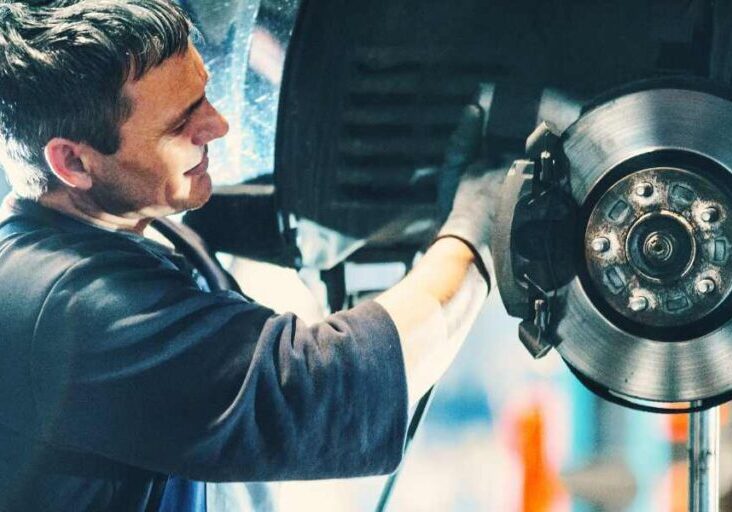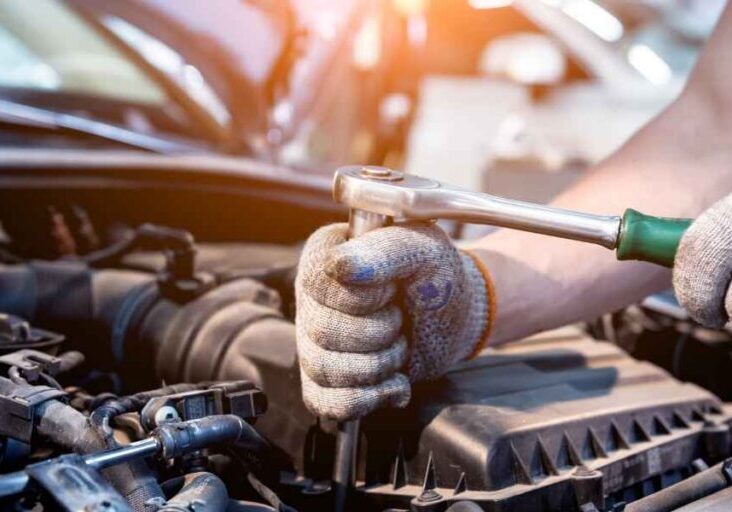Introduction
The braking system of your vehicle plays a critical role in ensuring safety, providing seamless stops when it mattersmost. However, with the passing of time, parts of your brake system can deteriorate, leading to diminished performance and potential hazards. This comprehensive guide aims to outline obvious indicators that your car could require brake servicing, underlining the importance of immediate attention to these warning signs. From unusual noises to issues with the brake pedal, staying observant can greatly enhance your road safety.
Understanding Brake Repair
1. Importance of Brake Maintenance
- Safety First: Properly functioning brakes are crucial for safe driving, as they allow you to stop or slow down your vehicle in emergencies. Brake repair should only be done by trained professionals who have the necessary knowledge and experience to ensure the job is done correctly. Neglecting brake maintenance can lead to serious accidents and costly repairs down the line.
- Preventive Maintenance: Regular brake inspections and maintenance can help identify issues early on, preventing more significant problems down the line. This can also help ensure that your brakes are functioning properly and efficiently, ultimately keeping you safe on the road. Regular maintenance can save you money in the long run by avoiding costly repairs or replacements.
2. Components of the Braking System
- Brake Pads: These friction materials press against the brake rotors to slow down or stop the vehicle. Brake pads are typically made of materials such as ceramic, semi-metallic, or organic compounds to provide the necessary friction for braking. They should be regularly checked and replaced when worn to ensure optimal braking performance and safety on the road.
- Brake Rotors: Rotors are metal discs that the brake pads clamp onto to create friction and stop the wheels from spinning. Brake rotors are typically made of cast iron or carbon ceramic material, and they play a crucial role in dissipating heat generated during braking. The size and design of the rotors can impact the overall performance and effectiveness of the braking system.
- Brake Calipers: These hydraulic devices house the brake pads and control their movement, pressing them against the rotors when you apply the brakes. The calipers play a crucial role in converting hydraulic pressure into mechanical force, allowing for efficient braking. They are typically located near the wheels and are essential for safe and reliable stopping power.
Warning Signs Your Car Needs Brake Repair
1. Squealing or Grinding Noises
- Squealing: High-pitched squealing noises when you apply the brakes can indicate that the brake pads are worn down and need replacement. If your brake is squealing, it is important to have it inspected by a professional as soon as possible to prevent further damage to the braking system. Ignoring this warning sign can lead to decreased braking efficiency and potentially dangerous driving conditions.
- Grinding: Grinding noises while braking typically suggest that the brake pads have completely worn down, and metal is grinding against metal. This is a severe issue that requires immediate attention. If your car is making these noises, it is important to have your brakes inspected and repaired as soon as possible to prevent further damage to the braking system. Ignoring this warning sign can lead to decreased braking efficiency and potential safety hazards on the road.
2. Vibrations or Pulsations
- Pedal Vibrations: If you feel vibrations or pulsations in the brake pedal when applying the brakes, it could indicate warped brake rotors or unevenly worn brake pads. This can lead to decreased braking performance and should be addressed by a professional mechanic as soon as possible to ensure safe driving conditions.
- Steering Wheel Vibrations: Vibrations in the steering wheel while braking may also point to issues with the braking system, such as warped rotors or worn brake components. This can be a sign that the brake pads are wearing unevenly or that there is a problem with the alignment of the brake calipers.
3. Soft or Spongy Brake Pedal
- Brake Pedal Feel: A soft or spongy brake pedal that sinks to the floor when pressed indicates air in the brake lines or a leak in the braking system. If you notice the pedal sinking, it is important to have your brakes inspected by a professional as soon as possible to ensure your safety on the road.
- Low Brake Fluid: Check the brake fluid level in the reservoir under the hood. Low brake fluid could also cause a soft pedal feel and should be addressed promptly. This could indicate a leak in the brake system, which can lead to brake failure if not fixed. Additionally, any strange noises or vibrations when applying the brakes could also be a sign that your car needs brake repair.
4. Longer Stopping Distances
- Increased Stopping Distances: If your car takes longer to come to a complete stop or requires more pressure on the brake pedal, it may indicate worn brake pads, glazed rotors, or other brake system issues. To prevent potential accidents, it is crucial to have your brakes inspected and repaired by a professional as soon as possible. Trust your instincts and don’t ignore any unusual noises or vibrations when braking, as these could also be signs of brake problems that need immediate attention.
- Loss of Brake Performance: Reduced braking performance compromises your ability to stop safely, increasing the risk of accidents or collisions. Brake performance may also be indicated by squealing or grinding noises, vibrations or pulsations felt in the brake pedal, or a longer than usual stopping distance. It is important to address any signs of brake issues promptly to ensure the safety of yourself and others on the road.
5. Dashboard Warning Lights
- Brake Warning Light: The brake warning light on your dashboard may illuminate if there’s a problem with the braking system, such as low brake fluid, ABS failure, or a brake system malfunction. This is indicated by the symbol of an exclamation point inside a circle. If this light comes on, it’s important to have your brakes inspected as soon as possible to ensure safe driving conditions and prevent further damage to your vehicle. Additionally, you may notice strange noises or vibrations when applying the brakes, which could also indicate a need for brake repair.
- ABS Warning Light: The ABS (anti-lock braking system) warning light may also indicate issues with the ABS, which requires immediate attention to ensure proper braking performance. You can see this light illuminate your dashboard when there is a problem with the brake system, such as low brake fluid or a malfunctioning sensor. It is important to address these issues promptly to maintain safe driving conditions.
Importance of Prompt Brake Repair
1. Safety Concerns
- Prevent Accidents: Addressing brake issues promptly helps prevent accidents or collisions caused by compromised braking performance.
- Protect Occupants: Properly functioning brakes are essential for the safety of you and your passengers, as they provide the ability to stop or slow down the vehicle in emergencies.
2. Cost-Effectiveness
- Prevent Further Damage: Addressing brake issues early can prevent more extensive damage to the braking system, potentially saving you money on costly repairs down the line.
- Long-Term Savings: Regular brake maintenance and timely repairs can extend the lifespan of your braking components, reducing the need for premature replacements.
Conclusion: Stay Vigilant for Brake Repair Signs
In conclusion, recognizing the signs that indicate your car needs brake repair is crucial for maintaining safety on the road and preventing costly repairs. From squealing noises to soft pedal feel and dashboard warning lights, staying vigilant for these warning signs can help you address brake issues promptly and ensure your vehicle’s braking system is in optimal condition. If you notice any of these signs, don’t hesitate to schedule a brake inspection with a qualified mechanic to diagnose and address the problem. Remember, your safety and the safety of others depend on the reliability of your vehicle’s brakes.
Anthony's Auto Service
Share this article:
You May Also Like



